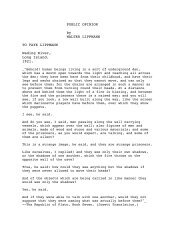Tacit Knowing: Its Bearing on Some Problems of Philosophy
Tacit Knowing: Its Bearing on Some Problems of Philosophy
Tacit Knowing: Its Bearing on Some Problems of Philosophy
You also want an ePaper? Increase the reach of your titles
YUMPU automatically turns print PDFs into web optimized ePapers that Google loves.
Michael Polanyi http://faculty.uml.edu/rinnis/45.301%20Ways%20<strong>of</strong>%20Knowi...<br />
pointers to designate things they mean. The comprehensive entity<br />
to which we are attending in meaningfully uttering such words is,<br />
to use E. C. Tolman’s term, a sign-gestalt: It is our act <strong>of</strong><br />
designating something and the means for doing so, when jointly<br />
experienced as pointing to that which we designate. Owing to the<br />
partial transpositi<strong>on</strong> <strong>of</strong> this experience to a distance, by which it is<br />
attached to the designated object, this object becomes in effect<br />
what we mean by our utterance.<br />
When we identify the elements <strong>of</strong> speech to which we are<br />
not attending at the time <strong>of</strong> our utterance, and switch our attenti<strong>on</strong><br />
to them, our utterance becomes meaningless. Repeat the word<br />
table, table, table, twenty times over, attending carefully to the<br />
sound <strong>of</strong> the movement <strong>of</strong> your lips and t<strong>on</strong>gue, and the meaning<br />
<strong>of</strong> the word will become remote, and finally dissolve altogether.<br />
That is <strong>of</strong>ten expressed by saying that words used meaningfully<br />
are transparent and that, when we c<strong>on</strong>centrate <strong>on</strong> a word as a<br />
sound, it becomes opaque. The transparent word is like a<br />
telescope through which we see its meaning - while, when<br />
rendered opaque, the word ceases to show us things bey<strong>on</strong>d itself<br />
and blocks our sight by its own meaningless body. To make<br />
explicit our tacit knowledge <strong>of</strong> a spoken word is to destroy the<br />
comprehensive entity, the sign-gestalt, to which the word<br />
c<strong>on</strong>tributed.<br />
This example <strong>of</strong> tacit knowing has extended the scope <strong>of</strong><br />
the term. A tacit coefficient now appears to be integral to all<br />
explicit statements. The bearing <strong>of</strong> a statement <strong>on</strong> experience can<br />
<strong>on</strong>ly be known tacitly; no statement can carry c<strong>on</strong>victi<strong>on</strong> unless it<br />
is understood, and all understanding is tacit.<br />
<str<strong>on</strong>g>Tacit</str<strong>on</strong>g> knowing can, indeed, be identified with<br />
understanding, if understanding is taken to include the kind <strong>of</strong><br />
practical comprehensi<strong>on</strong> which is achieved in the successful<br />
performance <strong>of</strong> a skill. This being allowed for, understanding<br />
may be recognized as the faculty, cast aside by a positivistic<br />
theory <strong>of</strong> knowledge, which the theory <strong>of</strong> tacit knowing<br />
acknowledges as the central act <strong>of</strong> knowing. In this sense the<br />
practice <strong>of</strong> skills, the diagnosing <strong>of</strong> physiognomies, the<br />
performance <strong>of</strong> tests, the use <strong>of</strong> tools and probes, and the<br />
meaningful uttering <strong>of</strong> denotative words, are so many acts <strong>of</strong><br />
understanding complex entities.<br />
Finally, am<strong>on</strong>g the most primitive forms <strong>of</strong> knowing, we<br />
meet the act <strong>of</strong> visual percepti<strong>on</strong>, and find in it the very paradigm<br />
<strong>of</strong> that structure <strong>of</strong> comprehensi<strong>on</strong> that I have postulated for<br />
knowledge at all levels. Seeing has supplied Gestalt<br />
psychologists with material for their discoveries which I am<br />
expanding here into a theory <strong>of</strong> knowledge. They have shown<br />
that our seeing is an act <strong>of</strong> comprehensi<strong>on</strong> for which we rely, in a<br />
most subtle manner, <strong>on</strong> clues from all over the field <strong>of</strong> visi<strong>on</strong>, as<br />
well as <strong>on</strong> clues inside our body, e.g., in the muscles c<strong>on</strong>trolling<br />
the moti<strong>on</strong> <strong>of</strong> the eyes and in those c<strong>on</strong>trolling the posture <strong>of</strong> the<br />
body. All these clues become effective <strong>on</strong>ly if we keep<br />
c<strong>on</strong>centrating our attenti<strong>on</strong> <strong>on</strong> the objects we are perceiving.<br />
Many <strong>of</strong> the clues <strong>of</strong> percepti<strong>on</strong> cannot be known in themselves<br />
at all; others can be traced <strong>on</strong>ly by acute experimental analysis;<br />
but all <strong>of</strong> them can serve the purpose <strong>of</strong> seeing, <strong>on</strong>ly if we make<br />
no attempt at attending to them in themselves. They must be left<br />
8 <strong>of</strong> 27 1/26/10 9:36 AM





